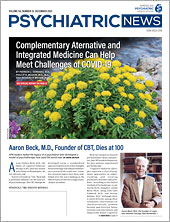The International Obsessive-Compulsive Disorders Accreditation Task Force (ATF)—a group of more than 60 experts representing 14 nations—has published a comprehensive set of specialty standards for the treatment of obsessive-compulsive disorder (OCD) in children and adults. The task force was created and is overseen by the Canadian Institute for Obsessive Compulsive Disorders (
CIOCD), a nonprofit whose central mission is to improve the quality and accessibility of OCD care across the globe.
OCD is a prevalent disorder that is a leading cause of medical disability worldwide, said Debbie Sookman, Ph.D., an associate professor of psychiatry at McGill University, specialist at the McGill University Health Center in Montreal, and chair of the OCD ATF. With specialized treatment, many patients with OCD can achieve a positive and sustained response, she said, but there are too few qualified professionals to meet global demand.
Evidence-based treatment for OCD begins with specialized cognitive-behavioral therapy (CBT) that is tailored to the patient’s specific symptoms, distress, and comorbidities, Sookman said. “Current research indicates that pharmacotherapy is often required for severe or intransigent illness, but pharmacotherapy alone is generally not optimal for OCD,” she continued.
Medical groups have produced practice guidelines for treating patients with OCD, but the new standards advance the field by creating specific evidence-based knowledge and skills that a professional should have to deliver effective OCD care.
The new knowledge and competency standards are divided into four comprehensive papers:
•
Pharmacotherapy for adult OCD
•
Pharmacotherapy for pediatric OCD
•
Specialized CBT for adult OCD
•
Specialized CBT for pediatric OCD
“The content [in these new standards] is broader than that of several [previously published] treatment guidelines,” noted Lorrin Koran, M.D., a professor emeritus of psychiatry at Stanford University and ATF member who coauthored the paper on pharmacotherapy for adults with OCD. Koran was also the chair of the work groups that created APA’s 2007 “Practice Guideline for the Treatment of Patients With Obsessive-Compulsive Disorder” and 2013 “Guideline Watch for OCD.”
The new pharmacotherapy standards explore such topics as the presentation and variety of OCD symptoms, the underlying pathology of illness, common medical comorbidities in OCD patients, medication side effects, and the use of transcranial magnetic stimulation for treatment-resistant OCD, he explained. Every section also clearly defines all relevant terms discussed and includes a list of future research priorities.
According to OCD experts, the development of these new standards for specialized OCD treatment represents a transformative advance in the field, as there is growing recognition worldwide that improving the quality and accessibility of evidence-based treatments for OCD is urgently required. “The ATF OCD knowledge and competency standards will serve as the foundation for the development of specialty training programs,” Sookman said.
The ATF is currently developing multilevel training protocols and evaluative measures based on these standards to the level of specialized certification and accreditation for clinicians and clinics, respectively. The next phase is the implementation of these standard-based training programs and evaluating their efficacy. ■
The entire collection of “Knowledge and Competency Standards for Specialized Treatments for Obsessive-Compulsive Disorder Throughout the Lifespan” is posted
here.
